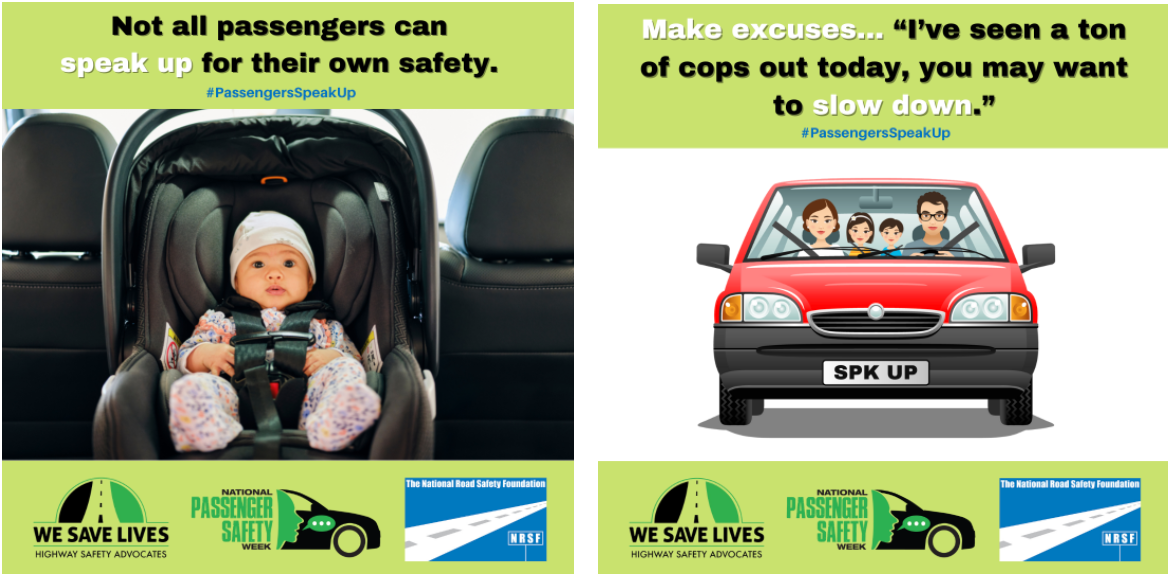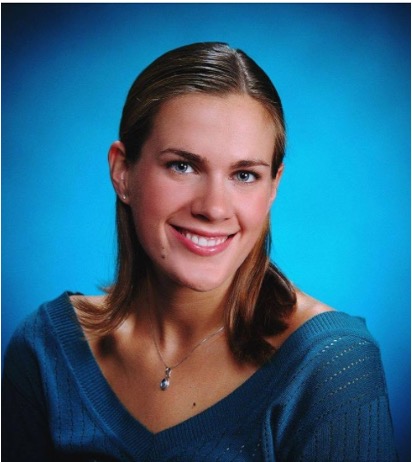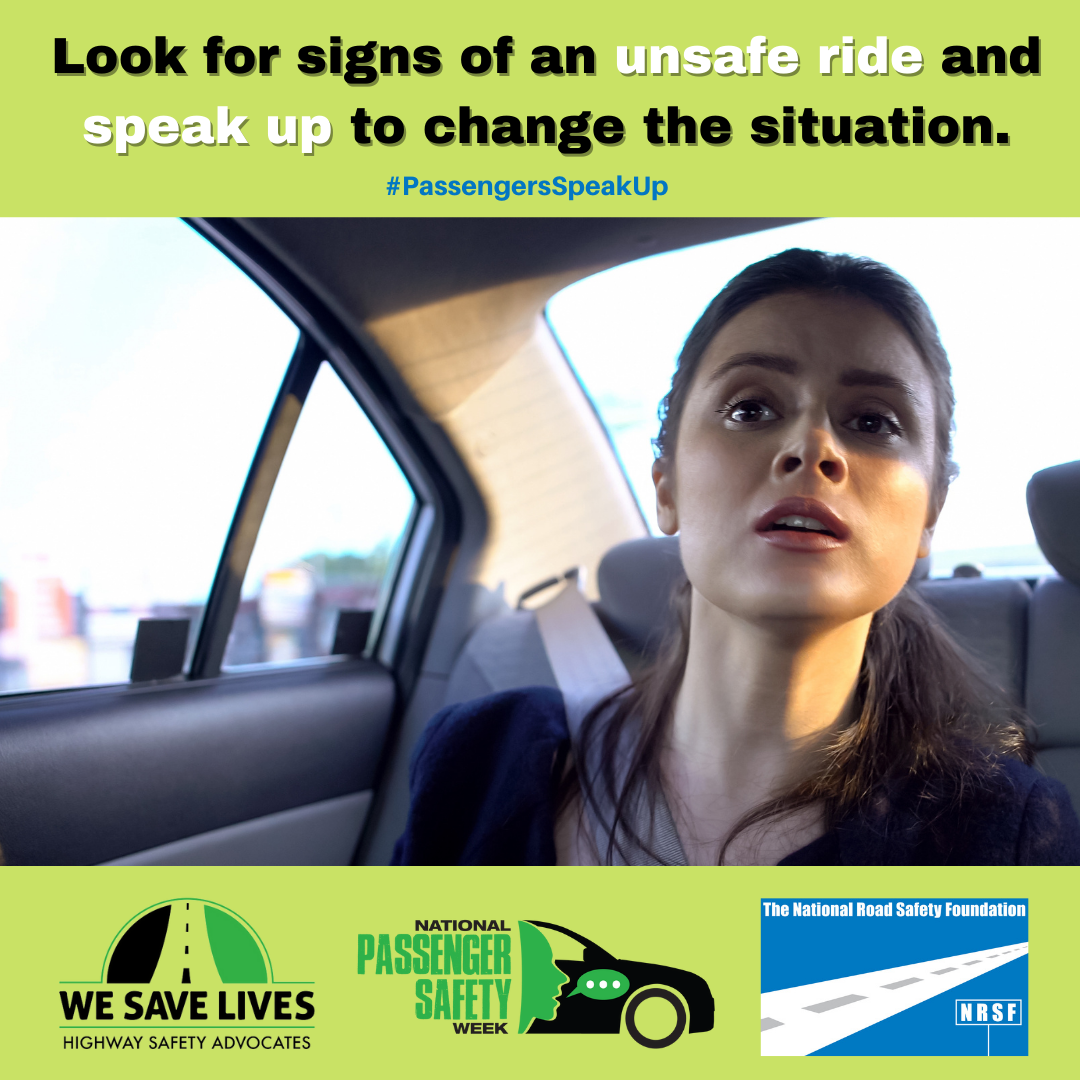Passengers should take action when a driver is drunk, drugged or distracted behind the wheel, a new public awareness campaign will argue — and it's raising provocative questions about the role of education in the fight to stop the most egregious driving crimes on U.S. roads.
On Wednesday, advocacy groups We Save Lives and the National Road Safety Foundation announced National Passenger Safety Week (Jan. 23-30), which seeks to "empower passengers to speak up and have the courage to intervene when their lives are threatened by an unsafe driver" through a series of educational initiatives, public service awareness campaigns, and individualized outreach efforts.
The Insurance Institute for Highway Safety estimates that 53 percent of children under 18 were vehicle passengers at the time of the crash, while the remainder are pedestrians, cyclists, or primarily in the case of teens, drivers themselves. For children under 13, 73 percent of the dead are vehicle passengers.

Some even credit the famous "friends don't let friends drive drunk" ads of the 1990s with a 30-percent decrease in drunk driving fatalities in the first four years of the initiative, though the architects of such campaigns acknowledge that it's hard to quantify the exact impact of education efforts when they're launched in concert with other interventions. The percentage of fatal crashes involving alcohol l has largely plateaued since 2014, despite the continued prevalence of PSAs, and the sheer number of DUI deaths rose an estimated nine percent between 2019 and 2020.
"Highway safety education efforts don’t always yield immediate results, and the long-term impacts are inherently difficult to measure," said Candace Lightner, founder of both We Save Lives and Mothers Against Drunk Driving, who lost her 13-year-old daughter, Cari, to an impaired motorist in 1980. "But we have found that effective public awareness campaigns are proven to have enormous impacts on behavior, and to make things like drunk driving socially unacceptable."
Lightner and her colleagues hope that National Passenger Safety Week will go even farther than the PSAs of the past.
In addition to ads, interviews, and social media graphics aimed at making it more socially acceptable for passengers to take action when they observe the person behind the wheel behaving dangerously, the campaign also offer a series of scripts and videos that model exactly how to do it in the moment.
That might involve, for instance, a passenger offering to serve as the "designated texter" so the driver isn't tempted to pick up her phone, or a parent asking a checklist of questions before allowing his child to catch a ride with another teen. Sometimes, Lightner says, it might even look like a child telling a parent to stop playing with the onboard "infotainment" system, or a teen calling the police on an impaired friend who refuses to hand over the keys.
"Passengers need to speak up, first, for their own safety, because they have a role in saving their own lives," she adds. "And ideally, you need to do it before everyone gets in the car. [If the dangerous driver insists on getting behind the wheel anyway,] tell that driver you’re going to call the police, give the police the make and model and the license plate number, and let them know which way you're going...At the very least, tell the driver 'I love you, and I want you to live — and I love me, and I want me to live."
Coming from a highway safety agency, of course, stressing the power of passengers to stop car crashes might seem like a kind of victim-blaming — particularly when those same agencies have failed to stop dangerous driving through broader systemic approaches.
Advocates have long criticized state DOTs for spending millions on distracted driving (and, even worse, "distracted pedestrian") campaigns while continually failing to build the kind of traffic-calming infrastructure that would all but force motorists to drive attentively. Congress, similarly, has drawn ire for failing to mandate Ignition Interlock Devices on all cars until the most recent infrastructure bill, even as drunk driving deaths surged and politicians publicly urged their constituents not to drink before getting behind the wheel.
But like Lightner herself, many of the most vocal supporters of the Passenger Safety week campaign don't have the power to issue vehicle safety reforms or end mandatory minimums that mandate ample parking lots in front of bars. They're the victims of traffic violence themselves, and their surviving loved ones — many of whom say intervention from passengers and bystanders could have made a difference that saved lives.

"Evan Bard was a beautiful, vibrant young woman who was killed in May of 2013 in an impaired driving crash," said Todd Bard, Evan's father and a supporter of the campaign. "She and her fiancé were attending the wedding of her best friend when they decided to leave. They were both obviously impaired and despite the bride’s concerns, she said nothing while Evan and her fiancé piled into their car, both too drunk to drive. On the way home Evan’s fiancé crashed into a pole killing her and injuring him. If only someone had the 'courage to intervene,' Evan would be alive today."
Seen through that lens — and particularly in light of transportation leaders' slow progress towards implementing broader changes to policy and infrastructure — Lightner hopes the campaign will help inspire a culture where speaking up about dangerous driving whenever possible is seen as an ethical responsibility and a social norm. And someday, perhaps dangerous driving itself will no longer be so broadly normalized, legalized, and encouraged by the very design of American communities.
"Obviously, the fault lies with the driver," Lightner adds. "But at the same time, you have to think of everyone else who's around — even the passengers, who are often killed themselves. Why did you get in the car? What could you have done to stop this?"






